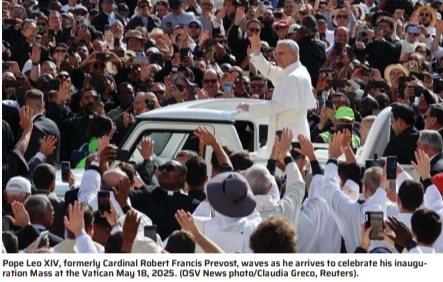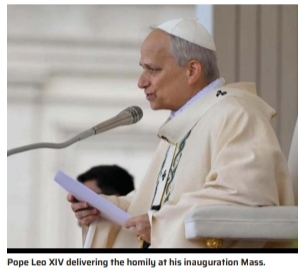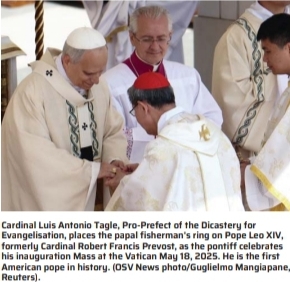
In his inaugural homily as the 267th Bishop of Rome, Pope Leo XIV offered more than ceremonial words—he delivered a pastoral blueprint marked by humility, theological depth, and a compelling call to love and unity. Standing before a sea of global dignitaries and faithful pilgrims gathered in St. Peter’s Square on May 18, 2025, the new pontiff set forth a vision for a Church that is not only anchored in tradition, but daringly open to the complexities of the modern world. In what many have dubbed unofficially as “This is the Hour for Love,” Pope Leo XIV introduced his pontificate as one of reconciliation, bridge-building, and bold missionary purpose. Central to his message were two enduring themes: love and unity.

These, he said, are the twin pillars of the mission entrusted to Peter by Christ. His reference to the poignant exchange between Jesus and Peter in the Gospel of John—”Do you love me?”—was not merely exegetical. It was revelatory of the kind of papacy he intends to lead: one grounded not in institutional dominance, but in divine mercy and pastoral intimacy. Delivered against a backdrop of loss and global unrest following the death of Pope Francis, Pope Leo XIV acknowledged the moment’s gravity. Many, he said, felt like “sheep without a shepherd.” Yet his presence conveyed a continuity of spirit, particularly with the legacy of Francis—whose focus on mercy, outreach, and the Church of the peripheries seems destined to deepen under his successor.
He called for a Church that is not an “autocrat” or an elite enclave, but a communion of “living stones” rooted in diversity and harmony. His words echoed the ecclesiological vision of the Second Vatican Council: a Church on pilgrimage, bound by love rather than law, led in charity rather than control. What was especially striking was Pope Leo’s expansive conception of mission. For him, evangelisation is not limited to proselytism—it is a healing act, a movement toward unity in a world fragmented by hatred, economic exploitation, and fear. The Church, he said, must be “a small leaven of unity within the world,” a radical notion in an age of division.
Drawing inspiration from Pope Leo XIII’s Rerum Novarum, he pointed to love as a transformative force not just in the Church, but in social and political life. In a moment when polarisation threatens ecclesial and global communities alike, Leo XIV resisted ideological binaries. His call for unity was not a flattening of difference but a celebration of it. He extended hands of friendship to other Christian churches, to other religions, and to all people of goodwill. It was not just a diplomatic nod—it was a bold affirmation of dialogue and mutual respect in an increasingly fractured world.


The pope did not avoid naming the wounds of our time—war, environmental destruction, social disintegration, and spiritual weariness—but he did so without resignation. He spoke as one animated by the Gospel’s central claim: that love, sacrificial and communal, is the path forward. Perhaps most memorable was his tone—not commanding, but fraternal. “I come to you as a brother,” he said, signaling a leadership style more horizontal than hierarchical. In an age wary of authority, Pope Leo XIV’s approach may be exactly what the Church—and the world—needs: not domination, but companionship. The challenges before him are vast.
But if his inaugural homily is a glimpse of what is to come, then this papacy is poised to be one not of walls, but of wideopen doors—doors that lead toward unity, mission, and above all, love. Because for Pope Leo XIV, love is not a comforting phrase—it is the Church’s lifeblood and the world’s greatest hope. As he concluded his homily with a simple yet profound exhortation—“Let us walk toward God and love one another”—a new chapter began. Not with grandeur, but with the gentle authority of a shepherd who truly knows, and loves, his flock.





